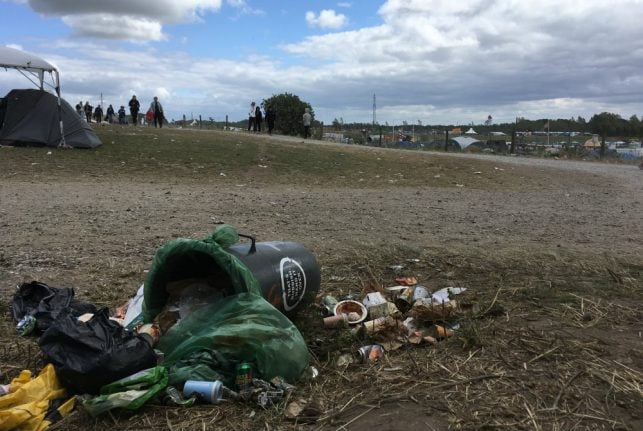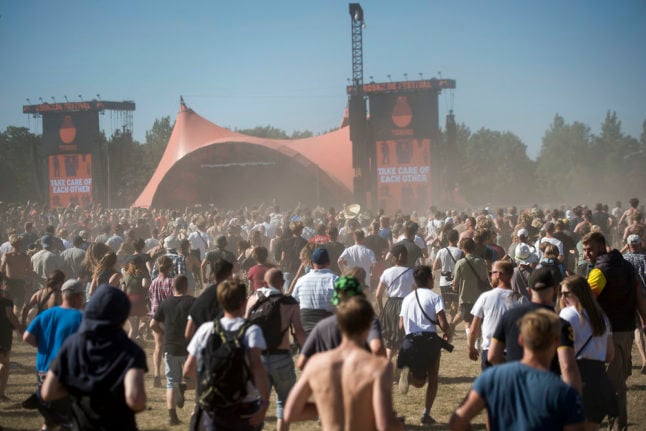Gusts of air blow across a recycling station in one of the Roskilde Festival’s camping zones, whipping newspapers and packaging from multipacks of beer high into the air.
A large container for plastic waste is piled to the brim with bits of broken tents, victims of a relentless wind that has blown throughout this year’s event.
Punctured blue air mattresses have been placed in a separate area and other containers are marked for metal waste and batteries.
It’s Wednesday afternoon and although the concert programme has barely begun, most of the guests have already camped in the area for several nights, following the tradition of days-long partying and warming up for the main event.
On their way to the festival area, some guests dart in behind the recycling containers to relieve themselves. Others take a discarded tent pole and use it to repair their own damaged setup.
This is the camping area known as ‘Clean Out Loud’, where guests are obliged to tidy their plots twice daily and take out rubbish and recycling.
Other camping areas do not have such rules, and trash piles up for days before the post-festival cleanup.

A recycling station in the Clean Out Loud area. Photo: Michael Barrett
Henrik Felby and Vincent Dall, two Danish festival guests who are camping in Clean Out Loud, pass by, bringing plastic sacks of refuse to add to the recycling pile.
“It’s important to minimize the impact on the environment that can come from a huge festival like this,” Felby says.
Sorting and managing waste is one of the biggest challenges faced by the Roskilde Festival, which has 130,000 guests and temporarily becomes Denmark’s fourth-largest city during its annual run.
The last three years have each seen over 2,000 tonnes of trash generated by guests.
Most of this waste is taken to incinerators post-festival after volunteers, who work in exchange for their tickets, clear the fields – right down to individual ring-pulls and bottle tops.
In 2018, a total of 296 tonnes of waste was re-used, a figure slightly down from the preceding two years.
Initiatives such as the Clean Out Loud camps have been introduced in an effort to change the festival’s culture on rubbish and recycling, says Sanne Stephansen, who is the programme leader for sustainability at Roskilde Festival.
“130,000 people at a site can be shown a lot of new things,” Stephansen says.
A big part of this is dialogue, she explains.
“(We can say) ‘bring your stuff here’, informing the audience of the consequences. Much of our sustainability programme is about behaviour,” she says.
Other initiatives to be trialed by the festival this year include an extended system for surcharging recyclable plastic cups, encouraging their return, and the introduction of a company, Gentræ, which specializes in collecting and reusing wood.
READ ALSO: Roskilde Festival 2019: New technology to play role as campers pitch tents
Getting guests to buy into reusing — taking things home after they have fulfilled their one-off festival purpose – is described by Stephansen as a “systemic” barrier to improving sustainability.
“When you can buy a package containing your ‘festival gear’ for 400 kroner, you don’t need to reuse it,” she says.
Evidence of this can be seen in the camping zones, where tents marked ‘2018’ – bought last year and brought back in 2019 as part of the festival’s sustainability drive — can be spotted, although they are few among the thousands of canvas roofs.

A 2018 Roskilde tent being reused. Photo: Michael Barrett
The camping zones, rather than the concert stages, are the hardest areas in which to effectively reuse and recycle, says Jakob Fallov, waste planner with Roskilde Municipality and the Roskilde Festival’s waste department.
“People mix (rubbish) together and don’t bring it to the right places,” says Fallov, who explains that over 10 percent of the city of Roskilde’s annual waste comes from its yearly music festival.
But there is some progress. Around 13 percent of waste, mostly consisting of metal and cardboard, is recycled. Plastic is more difficult because recyclable and unrecyclable materials are easily mixed together, Fallov says.
“But we are now able to recycle the metal from tents,” he says. “This year is the first time (for that).”
Clean Out Loud is gaining popularity, with 22,000 people staying in the zone in 2017 compared to 28,500 this year.
“But we can only walk at the same speed as the audience,” Fallov says.
And it’s not just down to cleaning and sorting, he points out, reiterating Stephansen’s remarks.
“We want them to take tents and sleeping bags (home) with them,” he says.
For Felby and Dall, the culture of cleaner living at festivals has potential to expand.
“Clean Out Loud should reach more people. If it becomes popular enough, the area could be extended so that more make an effort,” Felby says.
An old – perhaps outdated – festival argument is that being here, away from the real world for a while, is a way of freeing oneself of everyday responsibilities, including environmental ones. I put this to Dall and Felby.
“I think that’s bullshit. Being at a festival doesn’t mean you can throw out all your responsibilities. I’d argue it’s actually more important to take part in the cleaning-up effort,” Felby says.

Henrik Felby (L) and Vincent Dall, Roskilde guests at a recycling station. Photo: Michael Barrett
“Maybe a lot of people will say, ‘I come to my camp and leave it as though there’s been a tornado’, and you can’t persuade people like that to be different, so it’s important, as someone who can be persuaded, to make an effort for the collective,” he adds.
“Clean Out Loud shows it needn’t be boring or a pain in the arse to clear up. You can easily have a good time without going around in a pile of trash,” Dall says, adding:
“It makes such a difference, and we’re having such a great time, and we’re not swimming in cans.”



 Please whitelist us to continue reading.
Please whitelist us to continue reading.
Member comments